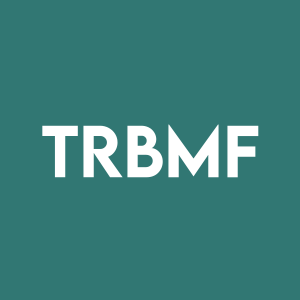Torq Drills 120 Meters of 1.33 g/t Gold, and 0.096% Copper Ending in Mineralization on Its Second Discovery Drillhole at Pircas Norte, Santa Cecilia Gold-Copper Project
Torq Resources announced the second set of results from the Phase II drilling program at its Santa Cecilia project in Chile's Maricunga belt. The significant findings include a 120-meter interval with 1.33 g/t gold and 0.096% copper, ending in mineralization. Another highlight is a high-grade quartz vein within this interval that returned 47.90 g/t gold. The company also reported other noteworthy intercepts, including 118 meters of 0.26 g/t gold and 0.034% copper from the surface. The results suggest potential for a large and high-grade mineralized body, encouraging further exploration. Additionally, at the Gemelos Norte target, a 98-meter interval yielded 0.18 g/t gold and 0.043% copper. CEO Shawn Wallace emphasized the strategic significance of these findings, pointing towards a substantial copper-gold system. The company plans further drilling to expand these discoveries amid a strengthening commodity market.
- Intercepted 120 meters of 1.33 g/t gold and 0.096% copper at Pircas Norte.
- High-grade quartz vein within the 120-meter interval showed 47.90 g/t gold.
- Additional 118 meters of 0.26 g/t gold and 0.034% copper from the surface.
- Encouraging results from drilling, indicating high potential in Pircas Norte.
- Plans for further drilling to explore extension targets and new discoveries.
- Gemelos Norte drill hole yielded 98 meters of 0.18 g/t gold and 0.043% copper.
- Potential for a large and high-grade mineralized body at Pircas Norte.
- Positive outlook in the context of a strengthening commodity market for gold and copper.
- True widths of mineralization remain unknown based on current data.
- Gemelos Norte target showed lower grades with no late-stage polymetallic veins identified.
- drilling data may not fully represent the project's overall potential.
- Results from some intervals demonstrated lower gold and copper grades.
VANCOUVER, BC / ACCESSWIRE / May 23, 2024 / Torq Resources Inc. (TSXV:TORQ)(OTCQX:TRBMF) ("Torq" or the "Company") is pleased to announce the second set of results from the recently completed Phase II drilling program at its Santa Cecilia project, located in the prolific Maricunga belt, in the Atacama region of Chile (Figure 1).
The second discovery hole, 24SC-DDH-005, intercepted an interval of 120 m with 1.33 g/t gold (Au),
At the Gemelos Norte drill hole 24SC-DDH-004 intercepted 98 m of 0.18 g/t gold and
A Message from Shawn Wallace, CEO and Chair:
"We believe we are amidst a discovery within a major copper gold system and today's results are a pivotal discovery milestone at our Santa Cecelia copper gold exploration project. Torq had previously identified numerous large scale porphyry targets and have tested three which have delivered through limited drilling considerable widths of mineralization over 500 meters in past holes and are now encountering much higher grades.
The next steps of exploration will be driven by both discovery extension target and new discoveries as we enter a strengthening commodity maket for copper and gold."
Table 1: Highlights of Torq's drill results from the Pircas Norte target at the Santa Cecilia gold copper project.
Hole ID | From (m) | To (m) | Length (m) | Au (g/t) | Cu (%) | Mo (ppm) | |
24SC-DDH-005 | 2 | 120 | 118 | 0.26 | 0.034 | 22.9 | |
128 | 182 | 54 | 0.20 | 0.058 | 14.0 | ||
238 | 242 | 4 | 0.16 | 0.013 | 5.6 | ||
316 | 322 | 6 | 0.23 | 0.050 | 7.1 | ||
376 | 496 | 120 | 1.33 | 0.096 | 15.4 | ||
Incl. | 386 | 496 | 110 | 1.44 | 0.103 | 16.5 | |
Incl. | 414 | 416 | 2 | 47.90 | 0.178 | 9.4 | |
Main interval is selected using Au grade*thickness no less than 0.5g/t*m with average interval grade no less than 0.1g/t, maximum consecutive dilution 6m; Sub-intervals are selected using Au grade*thickness no less than 1.0g/t*m with average interval grade no less than 0.2g/t, maximum consecutive dilution 4m; True widths of mineralization are unknown based on current geometric understanding of the mineralized intervals | |||||||
Table 2: Highlights of Torq's drill results from the Gemelos Norte target at the Santa Cecilia gold copper project.
Hole ID | From (m) | To (m) | Length (m) | Au (g/t) | Cu (%) | Mo (ppm) | |
24SC-DDH-004 | 12 | 22 | 10 | 0.36 | 0.004 | 4.8 | |
124 | 132 | 8 | 0.23 | 0.064 | 59.4 | ||
158 | 166 | 8 | 0.11 | 0.032 | 15.6 | ||
244 | 266 | 22 | 0.12 | 0.040 | 4.8 | ||
274 | 372 | 98 | 0.18 | 0.043 | 5.4 | ||
394 | 404.2 | 10.2 | 0.14 | 0.037 | 5.6 | ||
Main interval is selected using Au grade*thickness no less than 0.5g/t*m with average interval grade no less than 0.1g/t, maximum consecutive dilution 6m; True widths of mineralization are unknown based on current geometric understanding of the mineralized intervals | |||||||
Detailed Discussion.
The 2024 Phase II Santa Cecilia drill program comprised 1,500.2 m in three drill holes. Drill holes 23SC-DDH-003 and 24SC-DDH-005 were completed at the Pircas Norte target and drill hole 24SC-DDH-004 was completed at the Gemelos Norte target (Table 3).
Table 3: 2024 Drill Hole Summary
Hole ID | Azimut | Dip | Depth | Target | Comment |
24SC-DDH-003 | 15 | -60 | 600.0 | Pircas Norte | Ended in mineralization |
24SC-DDH-004 | 167 | -58 | 404.2 | Gemelos Norte | Bottom 160m @ 0.15ppm Au |
24SC-DDH-005 | 331 | -59 | 496.0 | Pircas Norte | Ended in mineralization, high grade Au veins |
The Pircas Norte and Gemelos Norte targets are located within 1 - 2 km of the Caspiche deposit. Pircas Norte has the largest surface footprint of observed porphyry mineralization at Santa Cecilia, measuring approximately 300 m x 400 m (Figure 2). Most of the Pircas Norte area is covered by colluvium. However, selective rock samples have returned values between 0.35 g/t Au and 1.43 g/t Au,
Drill hole 24SC-DDH-005, intersected various types of porphyritic units, some with autobreccia style, including wallrock fragments, mainly from early Paleocene basement. Like drillhole 24SC-DDH-003, the drilling has shown, overprinted on top of the Porphyry style mineralization, late-stage gold-lead-zinc veining, represented by pyrite, chalcopyrite, low-iron sphalerite, galena structures, particularly important at the bottom of the hole, where coarse, visible gold was encountered.
The units intersected by 24SC-DDH-005 may be summarized as follows (Figure 3, 4 & 5):
- Overburden, from 0 to 4.9 m
- Diorite Intrusive Breccia, from 4.9 to 68 m, fine grained porphyritic Diorite, locally autobreccia, and fine, dark wallrock and quartz veinlet fragments. Average 0.35 g/t Au,
0.04% Cu, 33 ppm Mo. Strongly oxidized, minor stockwork veining and late polymetallic veins. - Diorite Porphyry (Amphibole - Biotite), from 68 to 152 m, coarser grained than the former, local quartz grains. Average 0.14 g/t Au,
0.03% Cu, 9 ppm Mo. - Diorite Intrusive Breccia, from 152 m to 177.8 m, average 0.26 g/t Au,
0.09% Cu, 21 ppm Mo. Frequent Magnetite veining - Quartz Diorite Porphyry (Fine Grained), from 177.8 m to 203 m, average 0.07 g/t Au,
0.01% Cu, 5 ppm Mo. Minor veining, mostly late. - Late Diorite Porphyry, from 203 to 385.5 m, average 0.04 g/t Au,
0.01% Cu, 3 ppm Mo. Considered to be late stage, with very minor stockwork, rare late, polymetallic veins. Occasional wallrock lithic fragments. - Diorite Intrusive Breccia, from 385.5 to 496 m (end of hole), average 0.58 g/t Au,
0.1% Cu, 16 ppm Mo (for averaging purposes, 3 high gold grades, corresponding to late-stage veins, were normalized to 1.5g/t). This lithologic unit features intense A and D type stockwork veining. Also, numerous late polymetallic veins, up to 10 centimeters wide. At least one of these with visible gold: 484.63 m to 484.9 m @ 39.7 g/t Au, 19.1 g/t Ag,0.17% Cu,0.54% Pb and1.2% Zn. The average of this unit (110 m, from 386 to 496 m), including the high-grade vein material (three 2 m intervals) gives 1.44 g/t gold,0.103% Copper, 16.5 ppm Molybdenum.
This later unit is similar to the Intrusive Diorite Breccia intersected at the end of 24SC-DDH-003, with similar grades (168 m @ 0.46 g/t Au -
The high-grade gold and base metal late quartz veining intercepted at Pircas Norte in 24SC-DDH-005 is interpreted to represent a strong vector to the main gold-copper porphyry body which will be investigated with further drilling.
24SC-DDH-004 was drilled at the Gemelos Norte target, on the northeastern flank of the Gemelos Rhyolite Dome, some 550 m in diameter, where a clear gold and molybdenum anomaly was outlined by the 2022-2023 70 - 80 m spaced geochemical survey. Surface rock sampling and mapping confirmed the coincident location of thin, gold bearing stockwork at the dome lithology. The drill hole was set to test the anomaly and veining observed at surface. Results show the Rhyolite dome strongly anomalous in Moly, 108 m @ 124 ppm Mo in breccia zone (gold 0.07 g/t). The Porphyries lower down run lower Mo but higher gold, 170 m @ 0.15 g/t.
The units intersected by 24SC-DDH-004 may be summarized as follows (Figure 6):
- Overburden from 0 to 14, one 2 m sample @ 1.36 g/t Au.
- Gemelos Rhyolitic Dome, from 14 m to 234 m. Quartz bearing feldspar porphyry, locally brecciated, rarely banded, strongly argillized. This unit averages: 0.058 g/t Au,
0.016% Cu, 66 ppm Mo. One major stretch with discontinuous breccia intervals, from 56 to 150 m, averages 0.065 g/t Au,0.02% Cu, 138 ppm Mo. - Dacitic Porphyry, with Chlorite, Magnetite, 234 m to 334 m, averaging 0.14 g/t Au,
0.038% Cu, 4 ppm Mo. Frequent A and D veins. - Fine Grained Dacite Porphyry, from 334 m to 372 m, averaging 0.2 g/t Au,
0.044% Cu, 7 ppm Mo. Frequent A and D veins, local crackle breccia. - Quartz Diorite Porphyry, from 372 to 404.2 m (end of hole). Averaging 0.1 g/t Au,
0.026% Cu, 4 ppm Mo. D veins.
The results suggest that the porphyry system at the Gemelos Norte target is seperate from Pircas Norte with The volcanic Dome at Gemelos plays an important role, carrying sub economic molybdenum values in direct contact with Porphyry phases of interest. No late-stage polymetallic veins have been identified to date indicating the overall exploration potential of the early stage Gemelos Norte target. exploration ground almost untouched.
Next Steps:
Torq's technical team has completed the detailed geological logging and is in the process of updating the geological model to refine future drilling targets that will seek to expand the discovery at Pircas Norte as well as advance the discovery of more mineralized porphyry bodies thorughout the Santa Cecilia property.
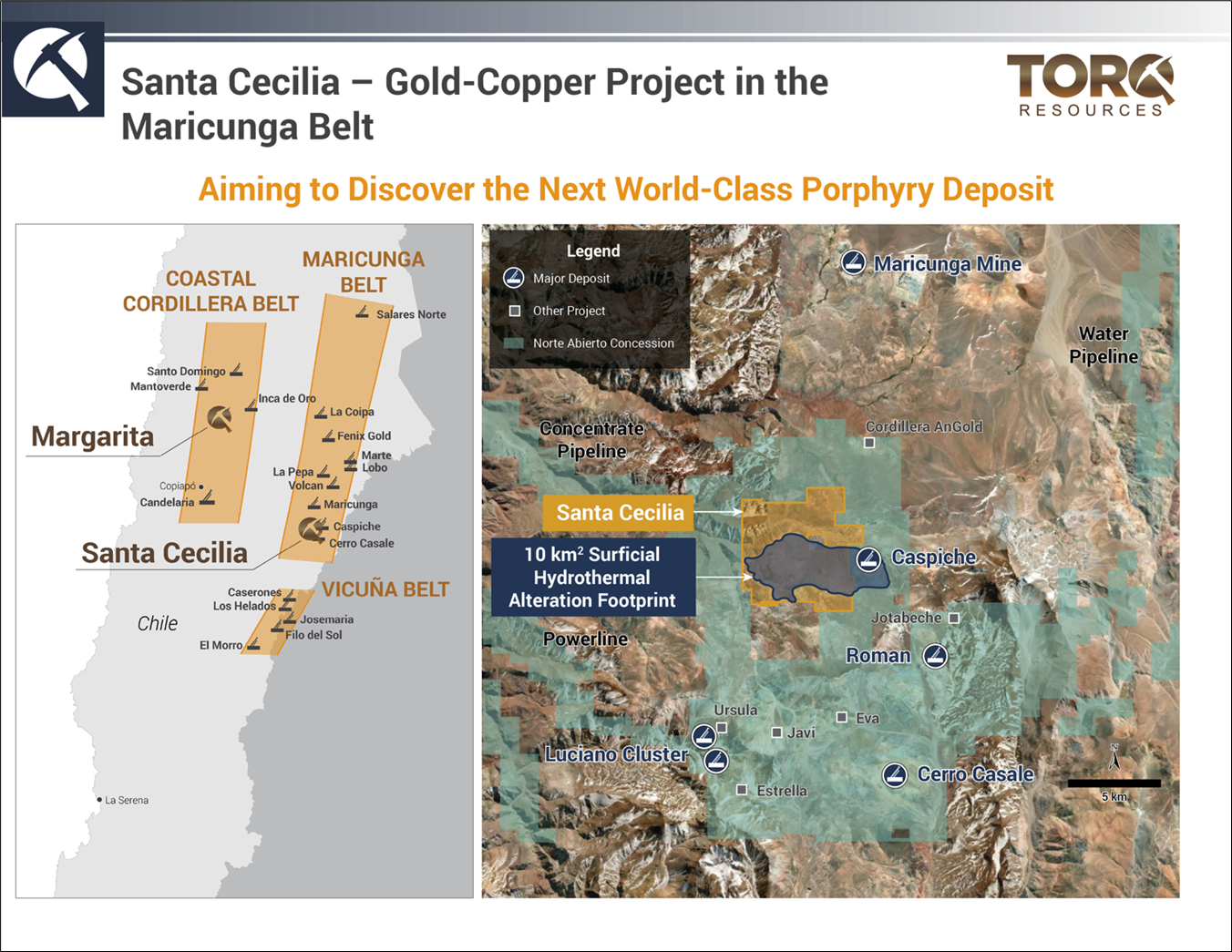
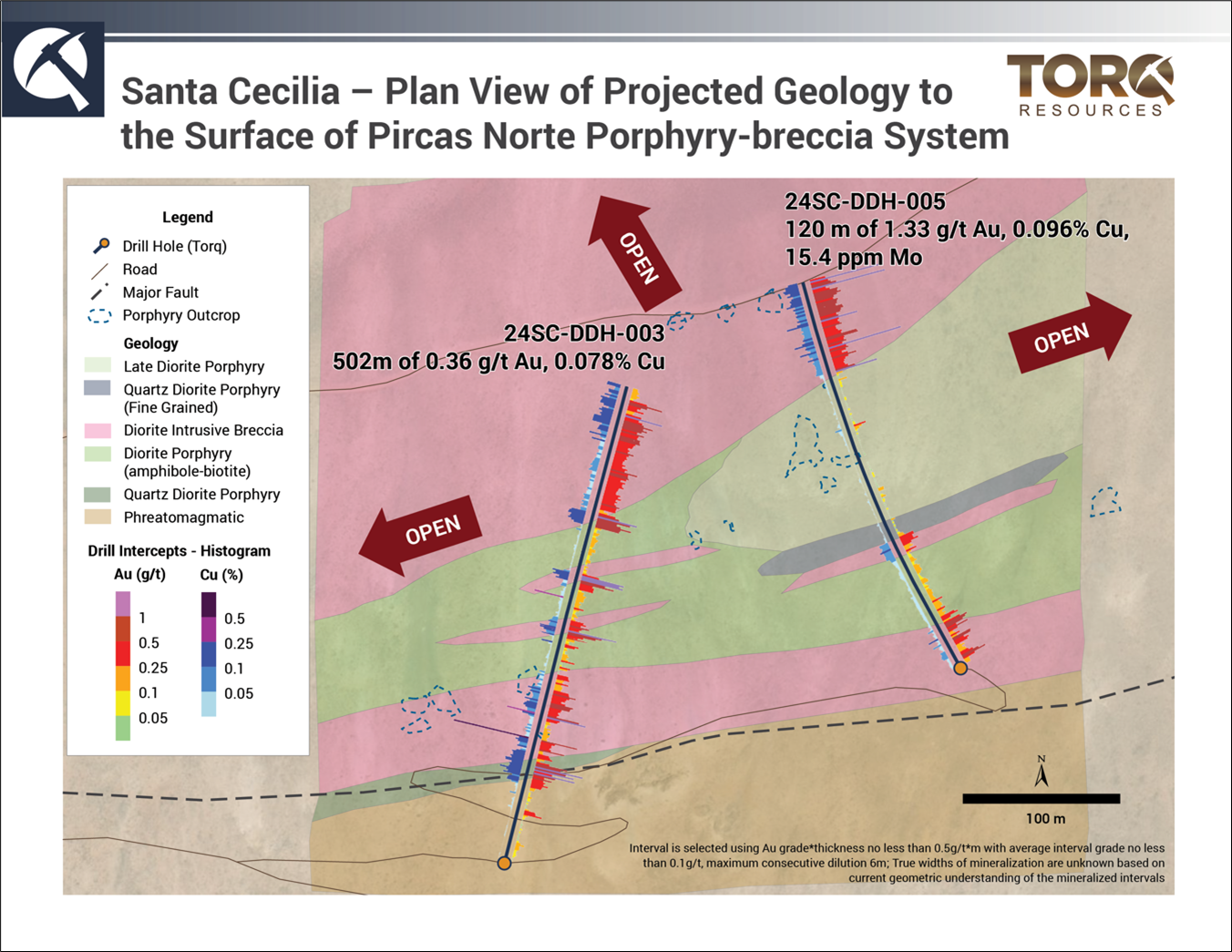
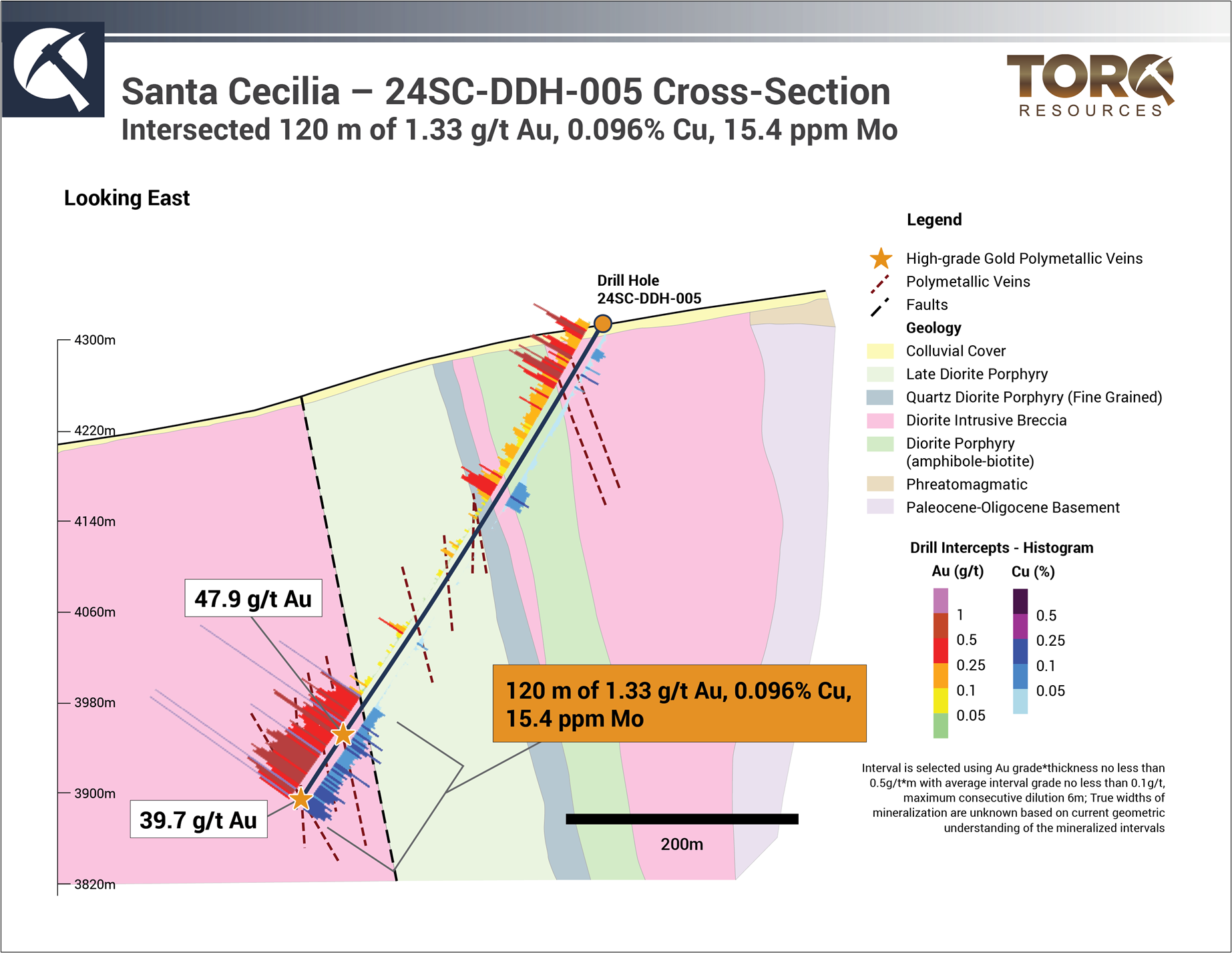
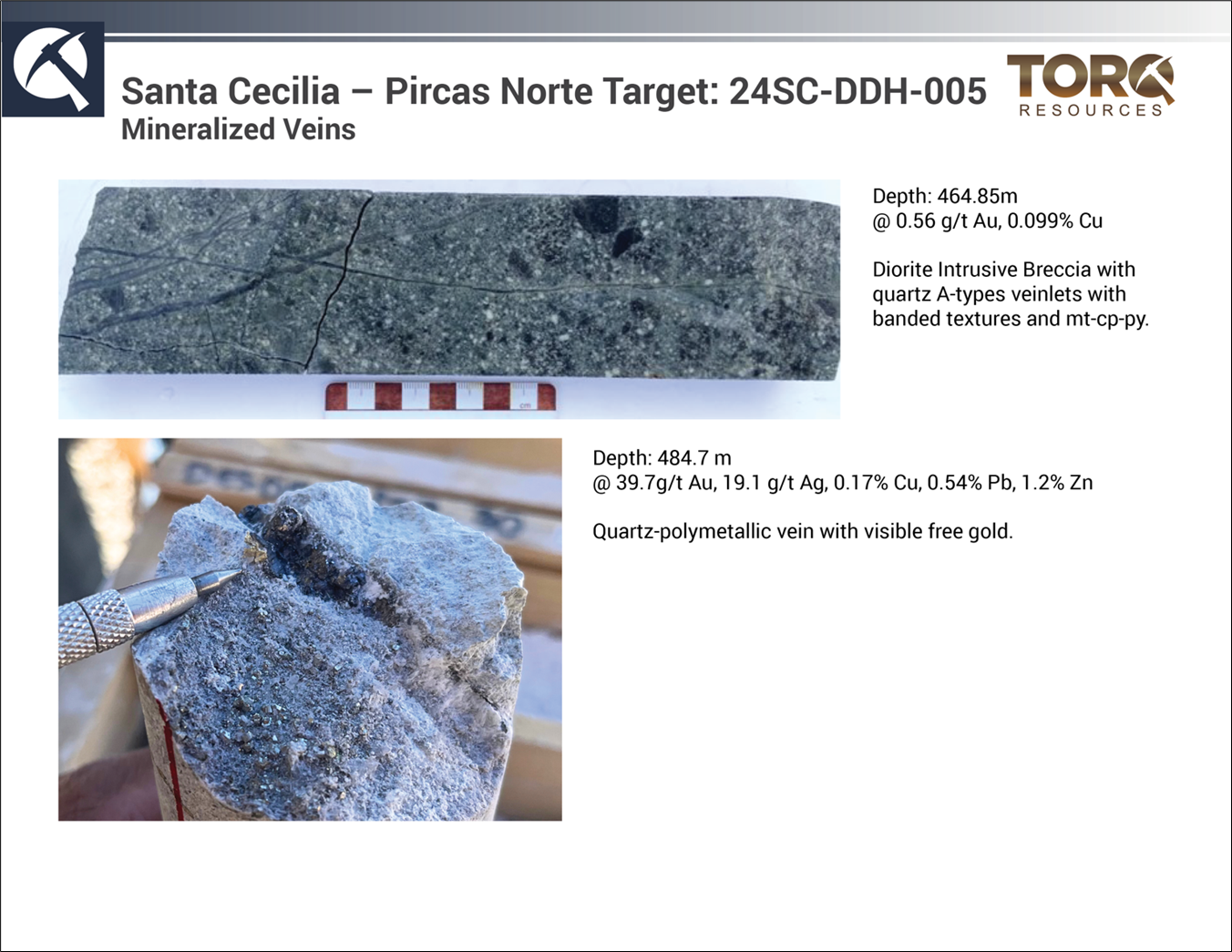
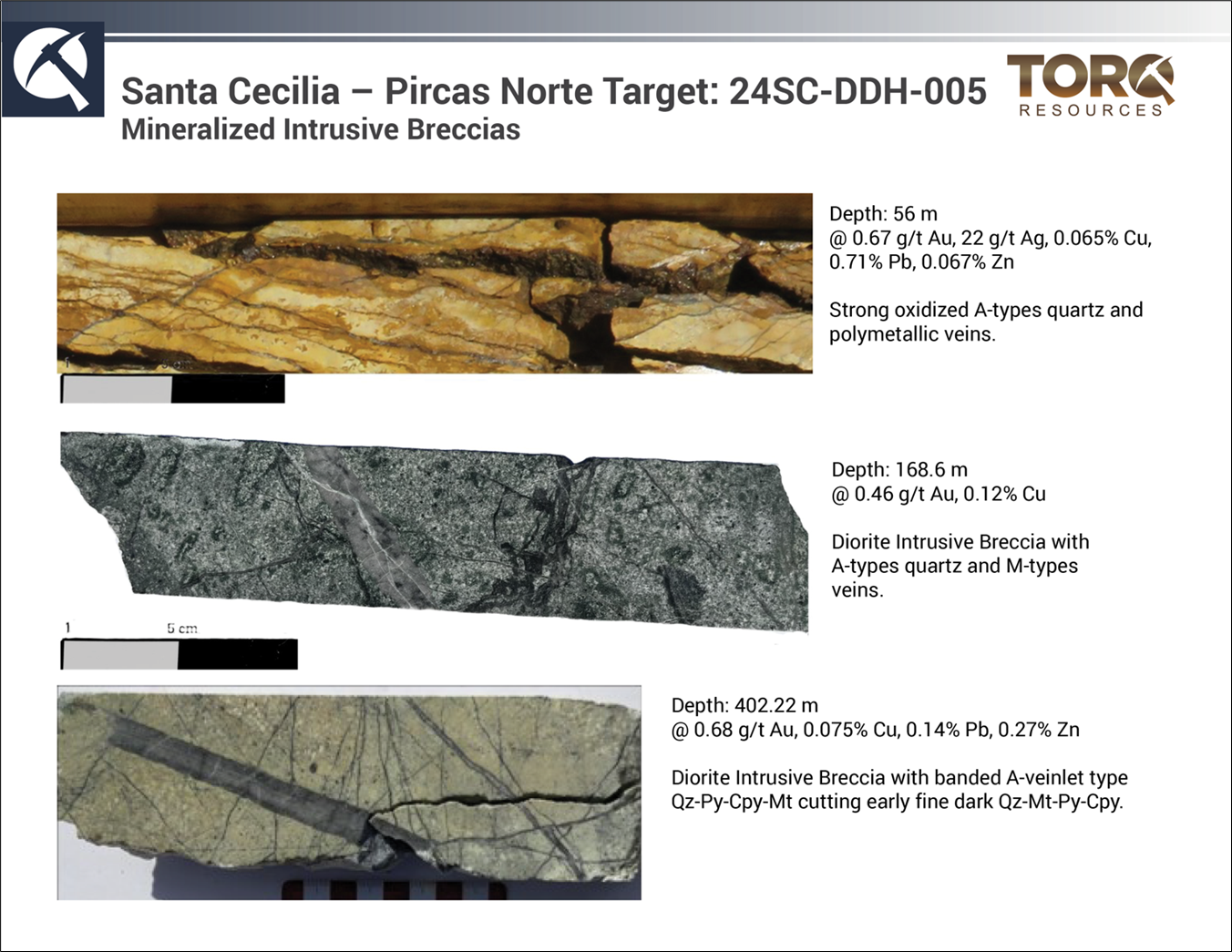
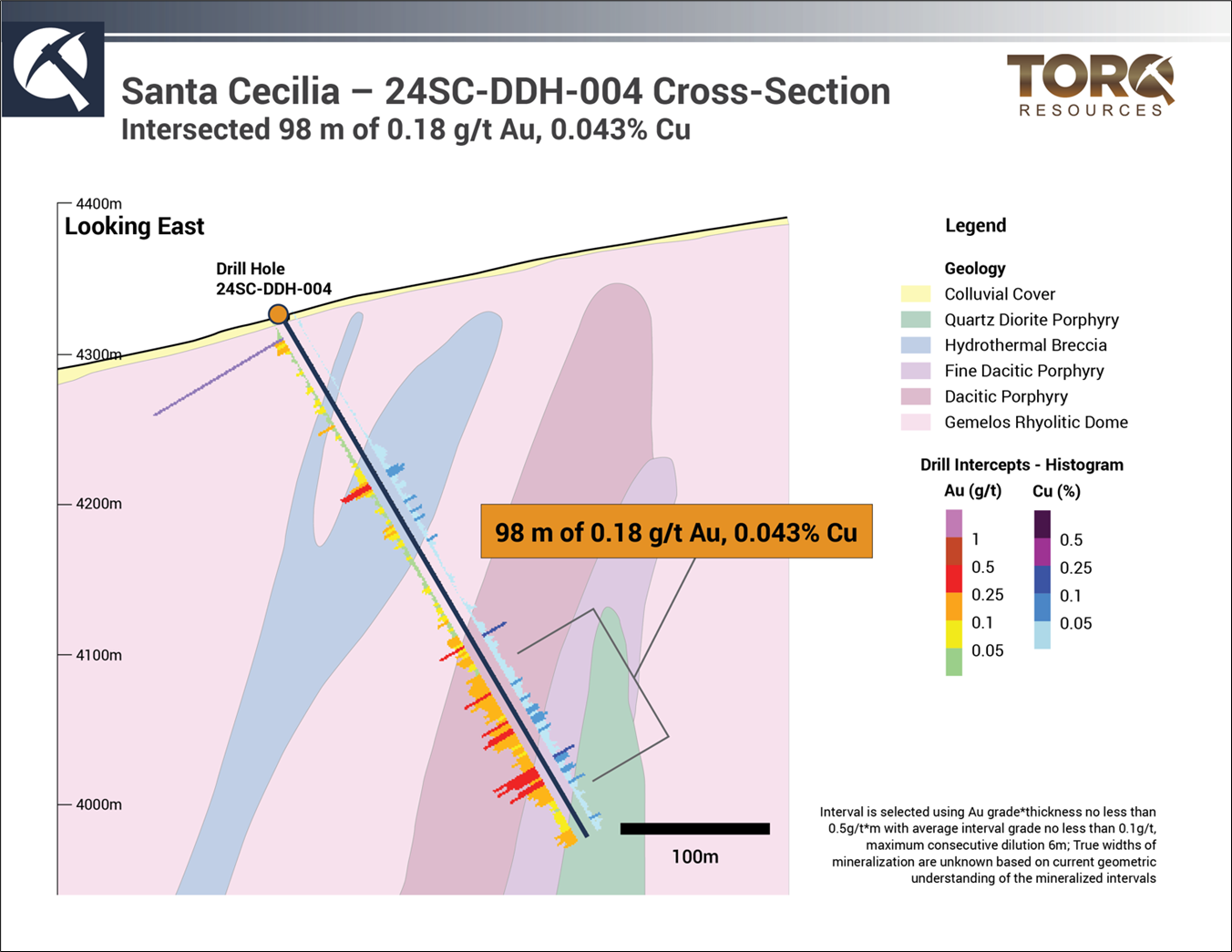
Bryan Atkinson. P. Geo. is the qualified person who has reviewed and approves of all the content in this press release.
ON BEHALF OF THE BOARD,
Shawn Wallace
CEO & Chair
For further information on Torq Resources, please visit www.torqresources.com or contact the company at (778) 729-0500 or info@torqresources.com.
Santa Cecilia Drilling 2024
Analytical samples were taken by sawing PQ or HQ diameter core into equal halves on site and sent one of the halves to ALS Lab in Copiapó, Chile or La Serena, Chile for preparation and then to Santiago, Chile and Lima, Peru for analysis. All samples are assayed using 30 g nominal weight fire assay with AAS finish (Au-AA23) and multi-element using four acid digest ICP-AES/ICP-MS method (ME-MS61). Where Au-AA23 results were greater than 10 ppm Au the assay were repeated with 30 g nominal weight fire assay with gravimetric finish (Au-GRA21). QA/QC programs for 2024 core samples using internal standard samples and duplicates, lab duplicates, standards and blanks indicate good accuracy and precision in a large majority of standards assayed.
About Torq Resources
Torq is a Vancouver-based copper and gold exploration company with a portfolio of premium holdings in Chile. The Company is establishing itself as a leader of new exploration in prominent mining belts, guided by responsible, respectful and sustainable practices. The Company was built by a management team with prior success in monetizing exploration assets and its specialized technical team is recognized for their extensive experience working with major mining companies, supported by robust safety standards and technical proficiency. The technical team includes Chile-based geologists with invaluable local expertise and a noteworthy track record for major discovery in the country. Torq is committed to operating at the highest standards of applicable environmental, social and governance practices in the pursuit of a landmark discovery. For more information, visit www.torqresources.com.
Forward Looking Information
This release includes certain statements that may be deemed "forward-looking statements". Forward-looking information in this release are statements that relate to closing of the Offering, use of proceeds, plans for future exploration programs, which are dependent on raising additional capital. These statements involve known and unknown risks, uncertainties and other factors which may cause actual results, performance or achievements of the Company to be materially different (either positively or negatively) from any future results, performance or achievements expressed or implied by some of the principal forward-looking statements. See Torq's Annual Information Form filed April 29, 2024, at www.sedarplus.ca for disclosure of the risks and uncertainties faced in this business.
Neither the TSX Venture Exchange nor its Regulation Services Provider (as that term is defined in the policies of the TSX Venture Exchange) assumes any responsibility for the adequacy or accuracy of this release.
SOURCE: Torq Resources Inc.
View the original press release on accesswire.com







